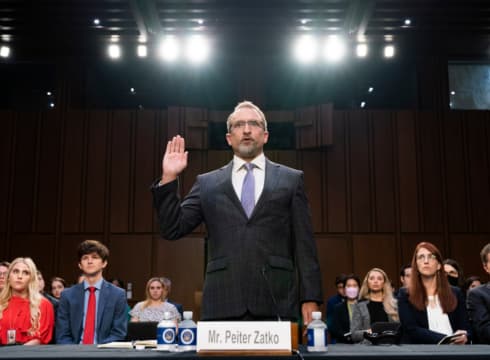The Indian agent(s) was placed to gauge whether the tech giant was willing to concede to the ruling party's demands for censorship: Zatko
Indian government forced Twitter to hire a specific individual(s) who were government agents, who would have access to vast amounts of Twitter sensitive data: Zatko
Twitter leadership is misleading the public, lawmakers, regulators and even its own board of directors: Zatko
Inc42 Daily Brief
Stay Ahead With Daily News & Analysis on India’s Tech & Startup Economy
In what appears to be damning allegations, Twitter’s former security chief Peiter Zatko told the US Senate that Twitter knowingly allowed India to place its ‘agents’ on the company’s payroll, allowing them to potentially access sensitive user data.
“The Indian government forced Twitter to hire specific individual(s) who were government agents, who would have access to vast amounts of Twitter sensitive data…By knowingly permitting an Indian government agent direct unsupervised access to the company’s systems and user data, Twitter executives violated the company’s commitments to its users”, said Zatko.
Speaking with ‘high confidence’, Zatko said that the Indian agent was placed at Twitter to better understand whether the social media giant was willing to concede to demands of the ruling BJP for censorship and how well those negotiations were shaping up.
The whistleblower made the disclosure before a Senate Judiciary Committee after being summoned by US lawmakers over the allegations made by him against the company in a complaint last month.
Replying to questions from US lawmakers, Zatko said that he believed that the hired agents tried to gather Twitter’s legal strategy amidst a flurry of orders issued by the Indian government to ban the accounts of opposition leaders and protesters.
Alleging that foreign governments could access critical user access through ‘agents’, Zatko said that Twitter ‘lacked the fundamental abilities to hunt for foreign intelligence agencies and expel them on their own.’
Elaborating on this, the whistleblower said that Twitter had no oversight over how its employees accessed user data and, thereby, were unable to detect when employees abused access to the said data.
“I am here today because Twitter leadership is misleading the public, lawmakers, regulators and even its own board of directors,” said Zatko before the panel.
Chiding Twitter for its vulnerable cyber security systems, Zatko told the senators that the privacy of users on the platform was at risk and that it could be exploited by ‘teenagers, thieves and spies.’ He also accused the Twitter top executives of misleading the public, lawmakers, regulators on the safety of the platform.
Accusing Twitter of not addressing basic systemic failures, Zatko said that the top leadership of the company ignored issues brought forward by engineers as ‘their executive incentives led them to prioritize profit over security.’
Meanwhile, Twitter has rubbished the claims and has said that its hiring process is ‘independent of any foreign influence’ and that access to data is instituted via a host of measures.
Govt vs Social Media Firms
This comes a couple of weeks after a parliamentary panel headed by Shashi Tharoor grilled top Twitter India executives over allegations that the social media giant allowed the centre to put its ‘agent’ on its roster.
The move also follows a long line of the tussle between the microblogging platform and the Indian government. In a major escalation of hostilities, Twitter approached the Karnataka High Court in July this year to quash 39 ‘blocking orders’ issued by the Ministry of Electronics and Information Technology (MeitY) between February 2021 and February 2022.
The orders which were issued under Section 69A of the IT Act sought to take down 175 tweets and 1,400 accounts.
This was preceded by another controversy whereby it was reported that authorities had ordered Twitter to take down a clutch of tweets that purportedly criticised internet censorship in India.
The number of content takedown orders issued by the government and the Indian courts rose 48,000% between 2014 and 2020.
This is part of a larger crackdown on social media platforms by the government. While the authorities have dragged Facebook and WhatsApp India over a contentious privacy policy update of the instant messaging app, other platforms are also in the dock for failure to act on fake news.
Previously, many senior bureaucrats have grilled top executives of platforms such as Google, Meta and Twitter for non-compliance with government orders. As if this was not enough, more than 102YouTube channels have so far been banned for flouting various norms related to the security of the state and over issues with regard to public order.
While the issues continue to escalate, the Centre last week informed the Delhi High Court that it would introduce a framework to regulate social media platforms ‘at some point in time’. Add to that, and the government also plans to bring in the overarching Digital India Act (DIA) to further tighten regulatory screws around social media platforms.
{{#name}}{{name}}{{/name}}{{^name}}-{{/name}}
{{#description}}{{description}}...{{/description}}{{^description}}-{{/description}}
Note: We at Inc42 take our ethics very seriously. More information about it can be found here.


